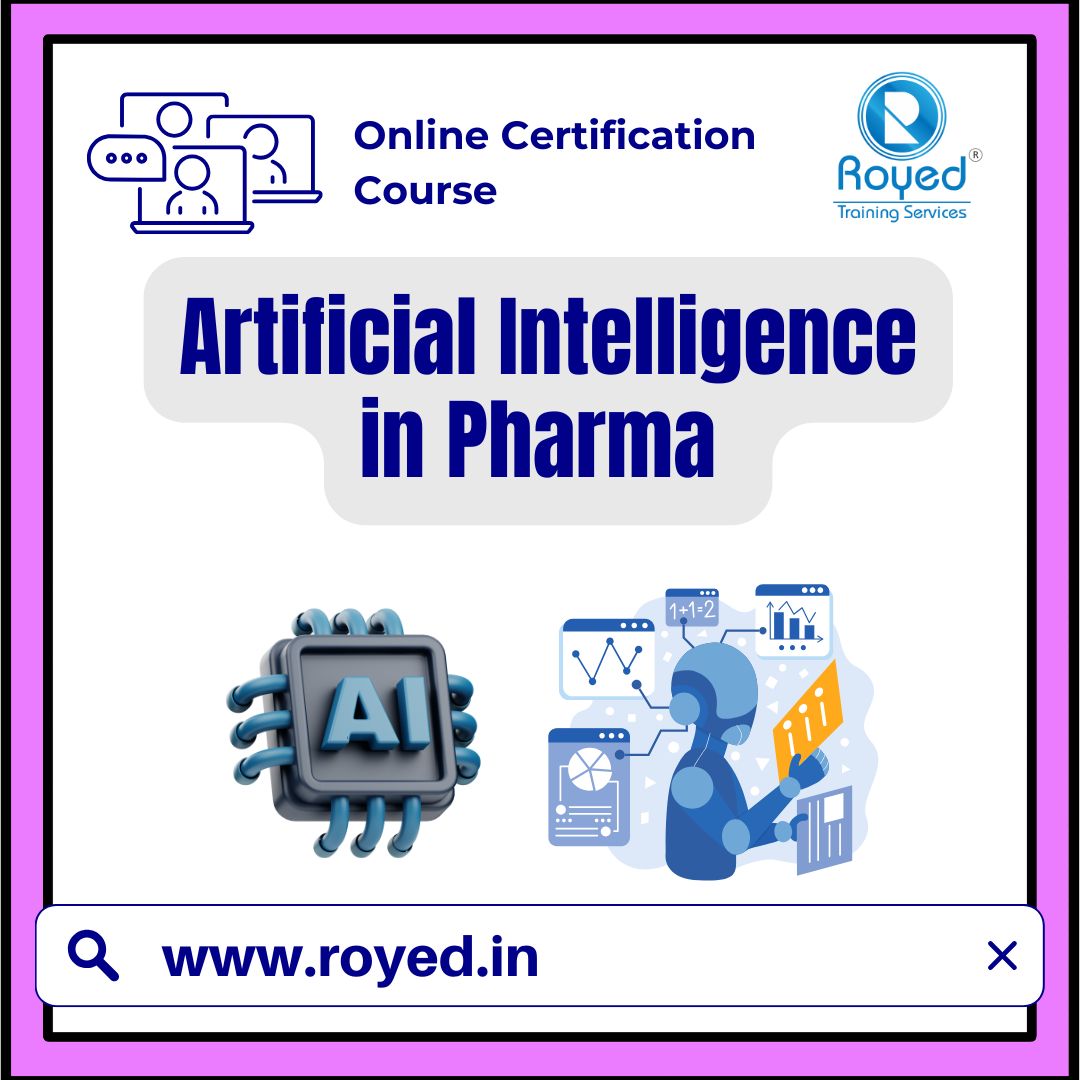
Introduction
Who should attend
What you will learn
Related Courses

Royed Training’s Advanced Certification on Artificial Intelligence in Pharma is a specialized online training program crafted to empower life science professionals with the essential knowledge and hands-on skills to understand and apply AI across pharmaceutical and healthcare domains.
This impactful course delivers fundamental AI concepts in a practical and accessible format, making it ideal for freshers and also for working professionals who want to upskill without disrupting their busy schedules. With a flexible learning approach, you can progress at your own pace while gaining industry-relevant expertise.
Through concise e-learning lectures, interactive simulations, quizzes, and real-world case studies, learners will explore how AI is transforming drug discovery, clinical development, pharmacovigilance, regulatory affairs, medical affairs, real-world evidence, and pharma marketing. This course also introduces key concepts such as machine learning, deep learning, data quality standards, and ethical considerations for AI adoption in healthcare.
By the end of this course, participants will be equipped with foundational AI literacy and practical insights to identify opportunities for AI integration within their functions—positioning themselves for future-ready roles in a data-driven pharmaceutical ecosystem.
Snapshot of the course
- Course Code: RYD-134
- Course Title: Advanced Certification Course on Artificial Intelligence (AI) in Pharma
- Access Duration: 1 Month
- Nature of the course: Online distance learning course. Course can be accessed online across anywhere 24×7.
- Certification: Certificate will be provided at the end of the successful completion of the course.
Who should attend?
- Pharma and biotech professionals in R&D, regulatory, PV, marketing, and medical affairs
- Clinical researchers and pharmacovigilance specialists
- Market access and health economics professionals
- Pharma educators and consultants looking to add AI to their skillset
What you will learn in Artificial Intelligence (AI) in Pharma Training?
By the end of the course, participants will be able to:
- Foundations of Artificial Intelligence (AI): Understand core AI concepts, terminology, and the differences between AI, machine learning (ML), and deep learning (DL).
- AI in Drug Discovery and Development: Learn how AI accelerates target identification, molecular screening, and clinical trial design.
- AI Applications Across the Pharma Value Chain: Explore AI’s role in regulatory affairs, pharmacovigilance, medical writing, medical affairs, and market access.
- AI in Real-World Evidence (RWE) & HEOR: Discover how AI enhances data extraction, patient segmentation, and real-world outcome analysis.
- Natural Language Processing (NLP) in Pharma: Understand how NLP is used to analyze scientific literature, clinical notes, and social listening for safety and marketing insights.
- Data Quality & Governance for AI: Grasp the importance of clean, structured data and regulatory compliance for successful AI adoption.
- Ethical and Regulatory Considerations: Learn about challenges such as bias, transparency, explainability, and ethical AI use in healthcare.
- Future Trends and Career Impact: Identify emerging AI trends and how they shape the future roles of life science professionals.
Note:
This first-of-its-kind, application-driven certification course delivers a unique and focused learning experience. It seamlessly combines foundational AI concepts with real-world pharmaceutical applications—designed specifically for life science professionals. Unlike generic AI programs, this course moves beyond theory. It offers practical, hands-on insights into how AI is transforming the pharma value chain.
From drug discovery and clinical trials to regulatory affairs, pharmacovigilance, and market strategy—every key area is covered through relevant use cases. The course integrates essential AI literacy with functional learning, making complex ideas easy to understand. As a result, participants gain not only core AI knowledge but also the ability to critically assess and apply AI tools in daily pharma operations.
Ultimately, this program equips professionals to stay future-ready and competitive in the rapidly evolving pharmaceutical and biotech landscape.


